Hello there!
I'm still alive and working on the game so I jump right into what I worked on in the last month or so. Even though I was pretty silent a lot has "changed". The topic will be polishing, because it never stops :P , some input handling tricks and another pretty complex one: game balance.
Polishing
During a series of play-test sessions with friends, family and old colleagues I gathered some really valuable feedback on how to enhance the user experience. Thankfully the game itself was well received, but the mentioned "issues" really bugged me, so I sat down for a week or two to further enhance the presentation.
Cost indicators
This was a tiny addition but helped a lot. Now the color of the chest and shop item cost texts reflect the state whether you can open/buy them.
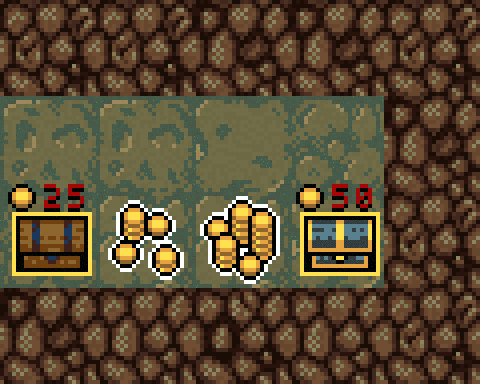
Animated texts
I went into an in-game UI tuning frenzy, so I added a "pop" animation on value change, besides the existing yellow highlights, to gold and attribute texts.
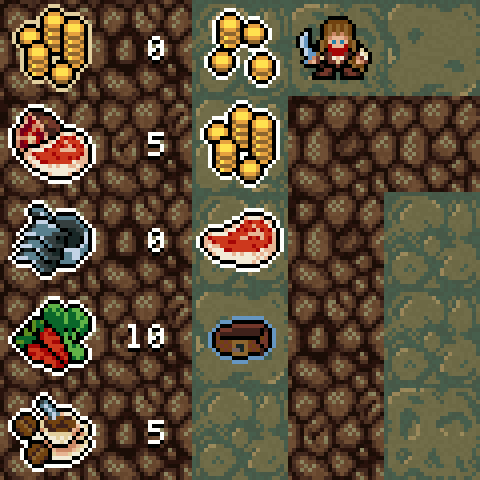
Health bar
The health bar got some love too! I implemented a fade-in/out effect for the heart sprite slowly turning it into a "black" one when you are low on health. I also added a maximum health indicator and the same value change "pop" animation I used for the gold and attribute texts.
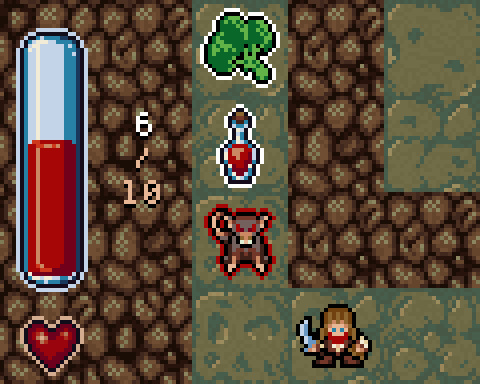
Battle events
Battle events and various skills (hit miss, dodge, fear or cripple events etc...) got many complaints due to their visibility being insufficient, leaving the player puzzled sometimes why a battle didn't play out as expected. Besides using the existing sprite effects I added text notifications, similar to the ones used with pickups. No complaints ever since :) .
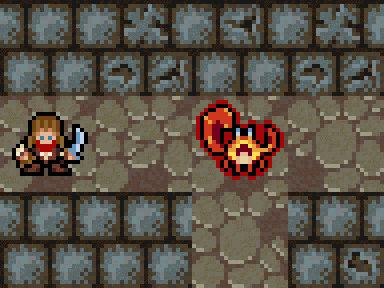
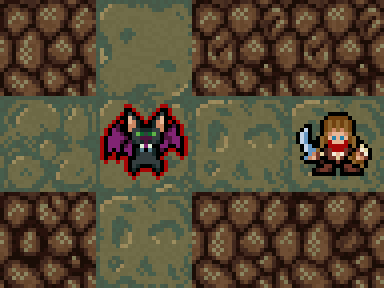
Critical strike
This one was an "extra". I wanted to beef-up the effects of the critical strikes to make them look more ferocious and better noticeable.
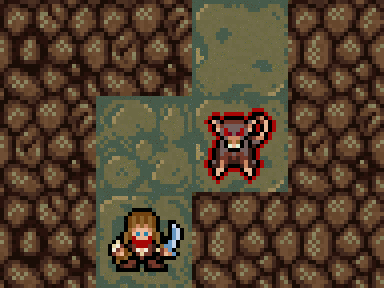
Level transition
Play testers shared my enthusiasm towards having a better level transition effect, so I slapped on a black screen fade-in/out during dungeon generation and it worked wondrous.
Input handling
I knew for a long time now, that the simple input handling logic the game had will not be good enough for the shipped version. I already worked a lot on and wrote my findings about better input handling for grid based games, so I'm not going to reiterate.
I mostly reused the special high-level input handling parts from my previous game Operation KREEP. It was a real-time action game, so some parts were obviously less relevant, but I also added tiny new extras.
I observed players hitting the walls a lot. Since the player character moves relatively fast from one cell to another this happened frequently when trying to change directions, so I added a timer which blocks the "HitWall" movement state for a few milliseconds towards each walled direction for the first time when a new grid cell is reached. Again, results were really positive :) .
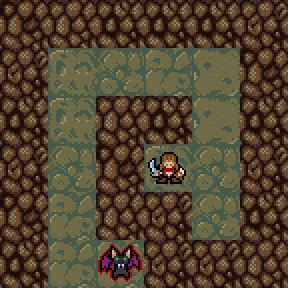
Balancing
My great "wisdom" about this topic: balancing a game, especially and RPG, is hard. Not simply hard, it is ULTRA hard. Since I never worked on an RPG before, in the preparation phase I guesstimated, that it will took around 2 to 3 days of full-time work, because after all it is a simple game. Oh maaaaaaan, how naive I was :( . It took close to two weeks. Having more experience on how to approach it and how to do it effectively I probably could do it in less than a week now with a similar project, but that is still far off from from 2/3 days :D .
Before anyone plays the judge saying, I'm a lunatic and spending this much probably wasn't worth it, I have to say, that during the last 6 months nothing influenced the fairness and "feeling" of the game as much as these last 2 weeks so do not neglect the importance of it :| !
Now onto how I tamed this beast!
Tools and approach
Mainly excel/open-office/google-sheets, so good old-fashioned charting baby :) . And how? I implemented almost all the formulas (damage model, pickup probabilities, loot system etc...) in isolated sheets, filled it with the game data and tweaked it (or the formulas sometimes) to reach a desirable outcome.
This may sound boring or cumbersome, but in reality charts are really useful and these tools help tremendously. Working with a lot of data is made easy and you get results immediately when you change something. Also they have a massive library of functions built-in so mimicking something like the damage reduction logic of a game is actually not that hard.
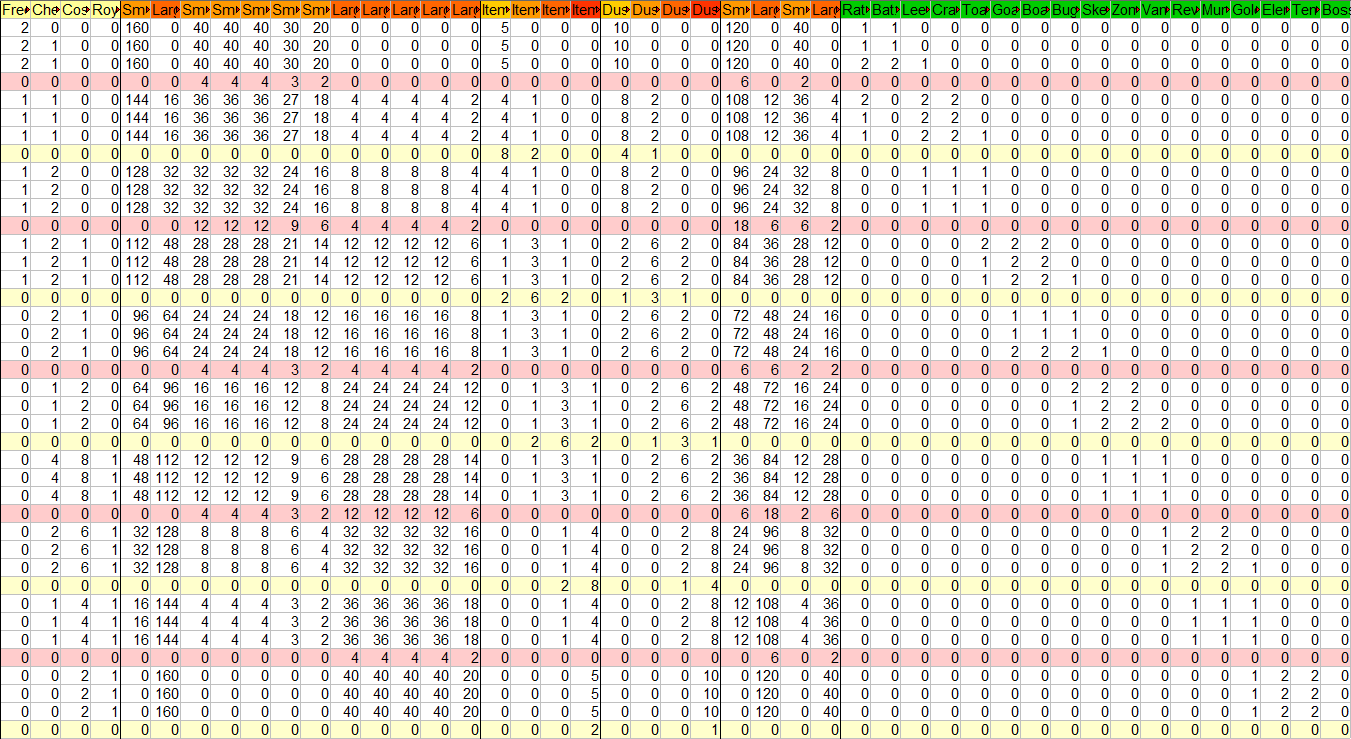
That is the main chart of the game, controlling the probabilities of specific pickups, chests and monsters occurring on levels. It plays a key role in determining the difficulty and the feel of the game so nailing it was pretty important (no pressure :P ).
If balancing this way is pretty efficient why it took so much time? Well, even a simple game like I Am Overburdened is built from an absurd number of components, so modeling it took at least a dozen gigantic charts :( . Another difficult aspect is validating your changes. The most reliable way is play-testing, so I completed the game during the last two weeks around 30 to 40 times and that takes a long while :D . There are faster but less accurate ways of course. I will talk about that topic in another post...
Tricks and tips
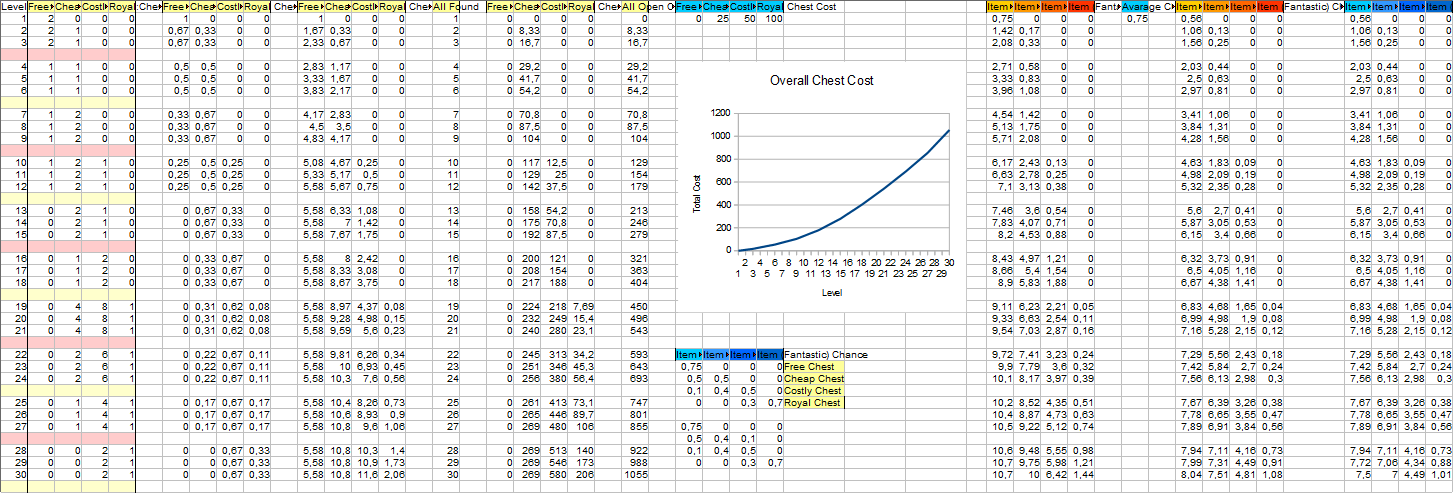
#1.: Focus on balancing ~isolated parts/chunks of your game first.
This wide "chest chart" works out how the chests "behave" (opening costs, probabilities, possible items). Balancing sections of your game is easier than trying to figure out and make the whole thing work altogether in one pass. Parts with close to final values can even help solidifying other aspects! E.g.: knowing the frequency and overall cost of chests helped in figuring out how much gold the player should find in I Am Overburdened.
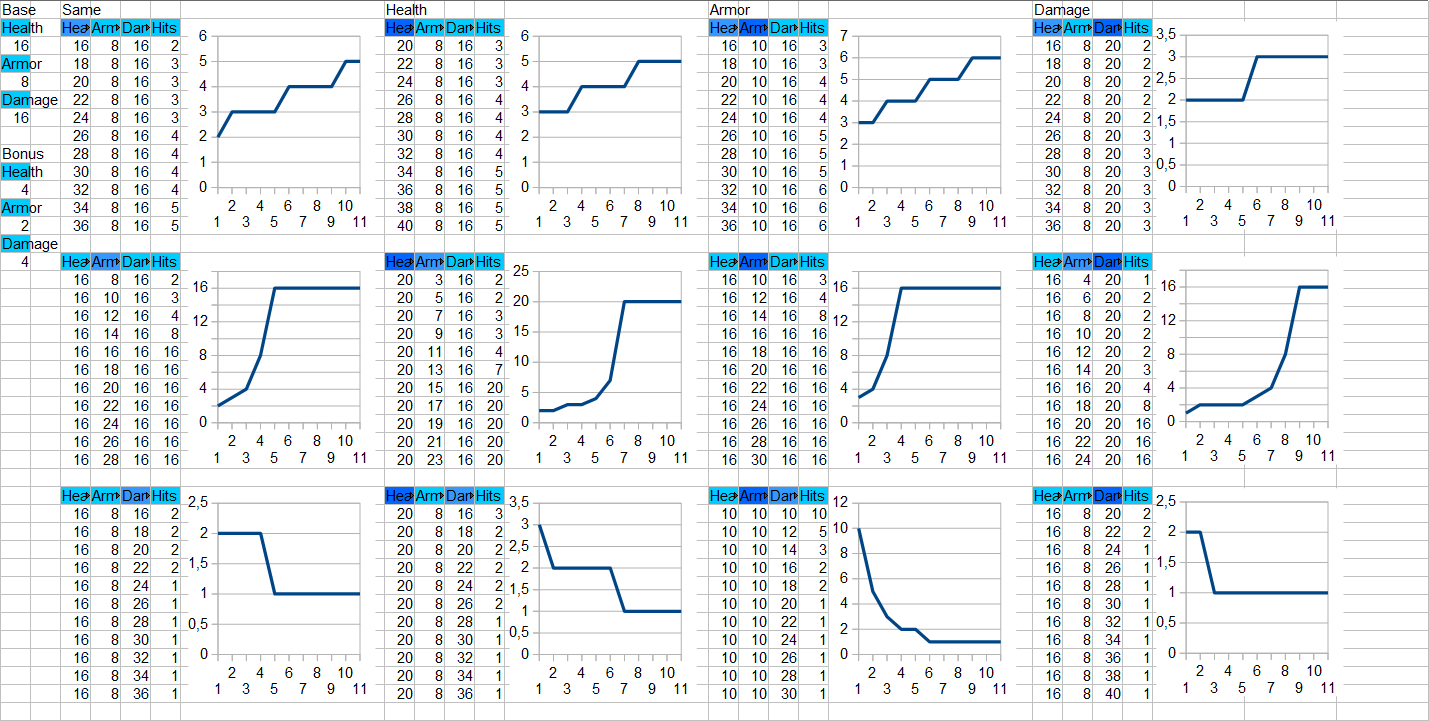
#2.: Visualization and approaching problems from different perspectives are key!
The battle model (attack/defense/damage/health formulas) wasn't working perfectly up until last week. I decided to chart the relation of the attack, defense and health values and how their change affect the number of hits required to kill an enemy. These fancy "damage model" graphs shows this relation. Seeing the number of hits required in various situations immediately sparked some ideas how to fix what was bugging me :) .
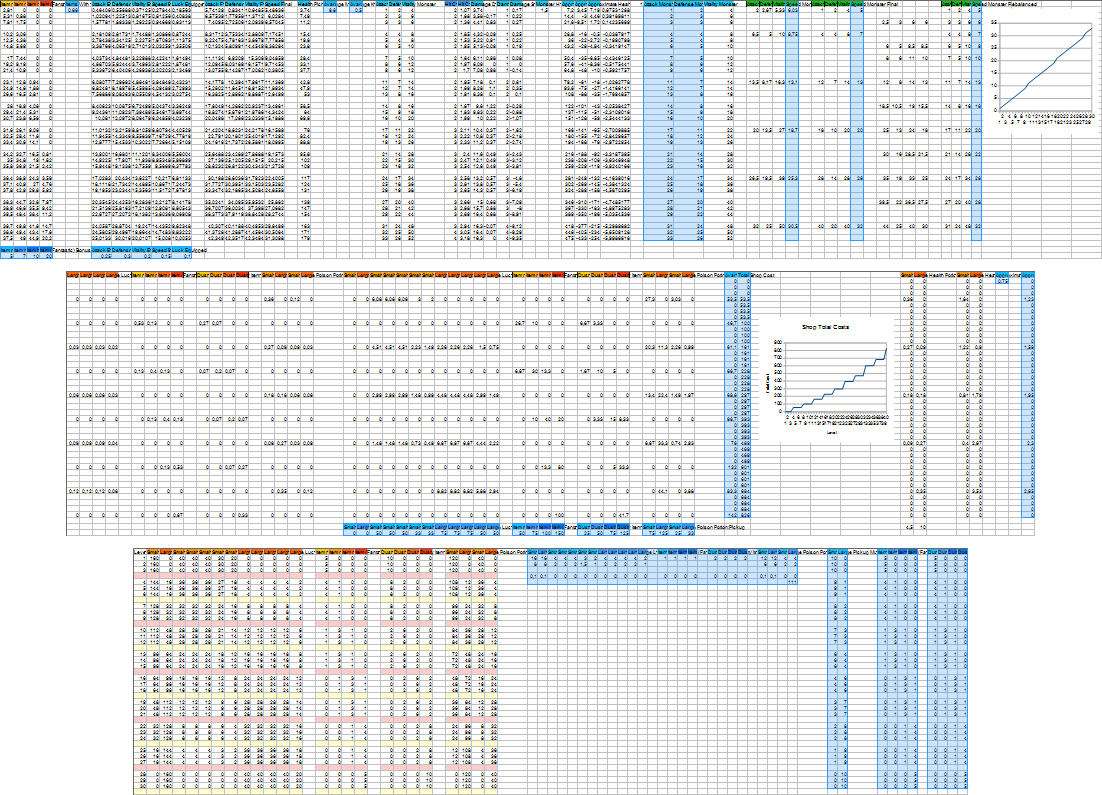
#3.: ~Fixing many formulas/numbers upfront can make your life easier.
Lot of charts I know, but the highlighted blue parts are the "interesting" ones. I settled on using them as semi-final values and formulas long before starting to balance the game. If you have some fixed counts, costs, bonuses or probabilities you can work out the numbers for your other systems more easily. In I Am Overburdened I decided on the pickup powers like the + health given by potions or the + attribute bonuses before the balancing "phase". Working out their frequencies on levels was pretty easy due to having this data. Also helps when starting out, since it gives lot of basis to work with.
Now onto the unmissable personal grounds. Spidi, you've been v/b-logging about this game for a loooooong while now, will this game ever be finished?! Yes, yes and yes. I know it has fallen into stretched and winding development, but it is really close to the finish line now and it is going to be AWESOME! I'm more proud of it than anything I've ever created in my life prior :) .
Soon, really soon...
Thanks for reading!
Stay tuned.

